Roberto Rossi
Grammar-Aware Literate Generative Mathematical Programming with Compiler-in-the-Loop
Jan 25, 2026Abstract:This work investigates generative mathematical programming through the lens of Algebraic Modelling Languages (AMLs) and compiler-guided model synthesis. By leveraging PyOPL, an OPL-like AML compiler that provides detailed syntax diagnostics, we introduce SyntAGM, an end-to-end system that translates natural language problem descriptions into PyOPL models via a generate--compile--assess--revise loop. SyntAGM is grammar-aware thanks to in-context exposure to the PyOPL BNF grammar, and benefits from few-shot retrieval of literate PyOPL model exemplars. To obtain a valid PyOPL model that matches the problem description, SyntAGM mobilises compiler feedback and an LLM-based alignment judge. In a comparative study against established prompting baselines SyntAGM achieves competitive accuracy with superior token, cost, and latency profiles.
Conformal Prediction for Electricity Price Forecasting in the Day-Ahead and Real-Time Balancing Market
Feb 07, 2025Abstract:The integration of renewable energy into electricity markets poses significant challenges to price stability and increases the complexity of market operations. Accurate and reliable electricity price forecasting is crucial for effective market participation, where price dynamics can be significantly more challenging to predict. Probabilistic forecasting, through prediction intervals, efficiently quantifies the inherent uncertainties in electricity prices, supporting better decision-making for market participants. This study explores the enhancement of probabilistic price prediction using Conformal Prediction (CP) techniques, specifically Ensemble Batch Prediction Intervals and Sequential Predictive Conformal Inference. These methods provide precise and reliable prediction intervals, outperforming traditional models in validity metrics. We propose an ensemble approach that combines the efficiency of quantile regression models with the robust coverage properties of time series adapted CP techniques. This ensemble delivers both narrow prediction intervals and high coverage, leading to more reliable and accurate forecasts. We further evaluate the practical implications of CP techniques through a simulated trading algorithm applied to a battery storage system. The ensemble approach demonstrates improved financial returns in energy trading in both the Day-Ahead and Balancing Markets, highlighting its practical benefits for market participants.
The importance of visual modelling languages in generative software engineering
Nov 27, 2024Abstract:Multimodal GPTs represent a watershed in the interplay between Software Engineering and Generative Artificial Intelligence. GPT-4 accepts image and text inputs, rather than simply natural language. We investigate relevant use cases stemming from these enhanced capabilities of GPT-4. To the best of our knowledge, no other work has investigated similar use cases involving Software Engineering tasks carried out via multimodal GPTs prompted with a mix of diagrams and natural language.
jsdp: a Java Stochastic Dynamic Programming Library
Sep 20, 2022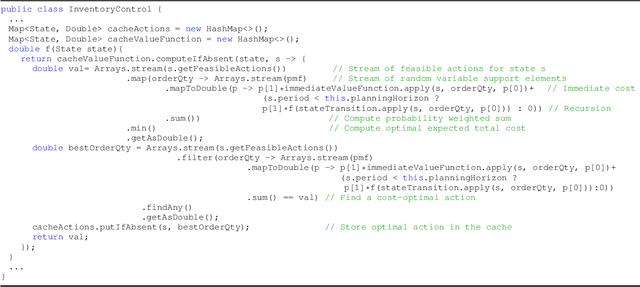
Abstract:Stochastic Programming is a framework for modelling and solving problems of decision making under uncertainty. Stochastic Dynamic Programming is a branch of Stochastic Programming that takes a "functional equation" approach to the discovery of optimal policies. By leveraging constructs - lambda expressions, functional interfaces, collections and aggregate operators - implemented in Java to operationalise the MapReduce framework, jsdp provides a general purpose library for modelling and solving Stochastic Dynamic Programs.
Declarative Statistics
Dec 28, 2017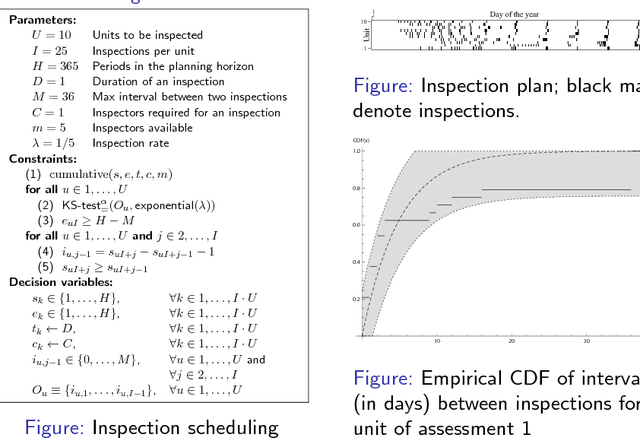
Abstract:In this work we introduce declarative statistics, a suite of declarative modelling tools for statistical analysis. Statistical constraints represent the key building block of declarative statistics. First, we introduce a range of relevant counting and matrix constraints and associated decompositions, some of which novel, that are instrumental in the design of statistical constraints. Second, we introduce a selection of novel statistical constraints and associated decompositions, which constitute a self-contained toolbox that can be used to tackle a wide range of problems typically encountered by statisticians. Finally, we deploy these statistical constraints to a wide range of application areas drawn from classical statistics and we contrast our framework against established practices.
Stochastic Constraint Programming as Reinforcement Learning
Apr 24, 2017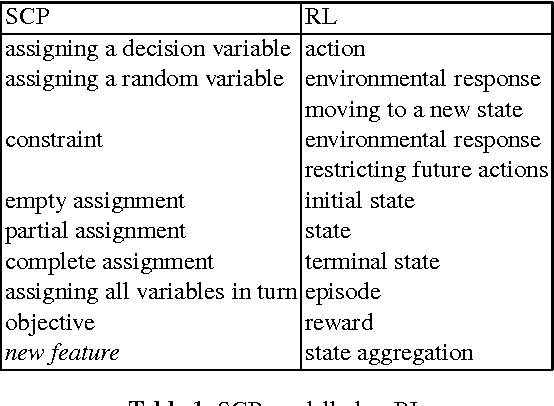
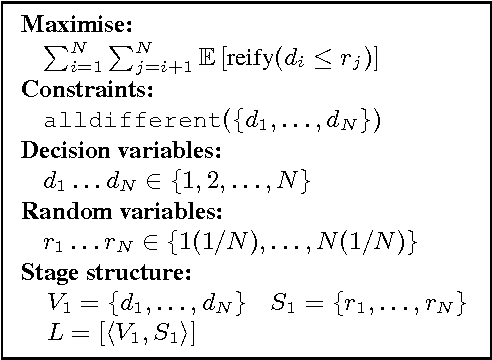
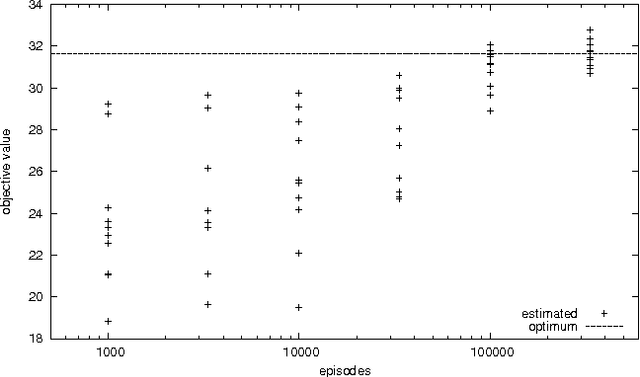

Abstract:Stochastic Constraint Programming (SCP) is an extension of Constraint Programming (CP) used for modelling and solving problems involving constraints and uncertainty. SCP inherits excellent modelling abilities and filtering algorithms from CP, but so far it has not been applied to large problems. Reinforcement Learning (RL) extends Dynamic Programming to large stochastic problems, but is problem-specific and has no generic solvers. We propose a hybrid combining the scalability of RL with the modelling and constraint filtering methods of CP. We implement a prototype in a CP system and demonstrate its usefulness on SCP problems.
The BIN_COUNTS Constraint: Filtering and Applications
Dec 14, 2016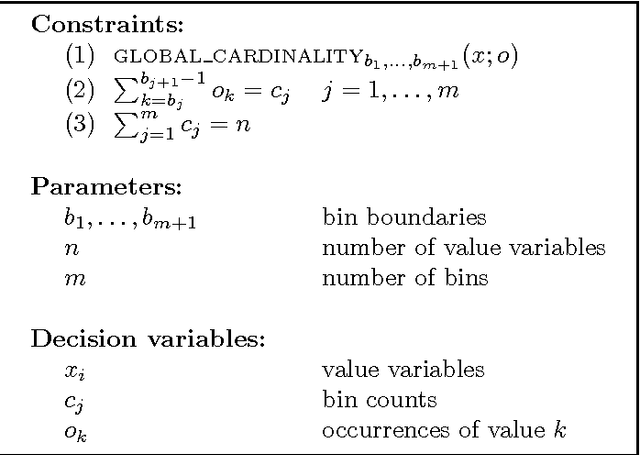



Abstract:We introduce the BIN_COUNTS constraint, which deals with the problem of counting the number of decision variables in a set which are assigned values that lie in given bins. We illustrate a decomposition and a filtering algorithm that achieves generalised arc consistency. We contrast the filtering power of these two approaches and we discuss a number of applications. We show that BIN_COUNTS can be employed to develop a decomposition for the $\chi^2$ test constraint, a new statistical constraint that we introduce in this work. We also show how this new constraint can be employed in the context of the Balanced Academic Curriculum Problem and of the Balanced Nursing Workload Problem. For both these problems we carry out numerical studies involving our reformulations. Finally, we present a further application of the $\chi^2$ test constraint in the context of confidence interval analysis.
Confidence-based Reasoning in Stochastic Constraint Programming
Jul 05, 2015


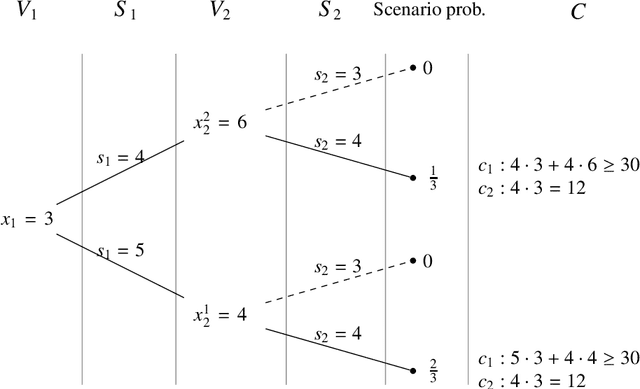
Abstract:In this work we introduce a novel approach, based on sampling, for finding assignments that are likely to be solutions to stochastic constraint satisfaction problems and constraint optimisation problems. Our approach reduces the size of the original problem being analysed; by solving this reduced problem, with a given confidence probability, we obtain assignments that satisfy the chance constraints in the original model within prescribed error tolerance thresholds. To achieve this, we blend concepts from stochastic constraint programming and statistics. We discuss both exact and approximate variants of our method. The framework we introduce can be immediately employed in concert with existing approaches for solving stochastic constraint programs. A thorough computational study on a number of stochastic combinatorial optimisation problems demonstrates the effectiveness of our approach.
* 53 pages, working draft
Statistical Constraints
Aug 14, 2014

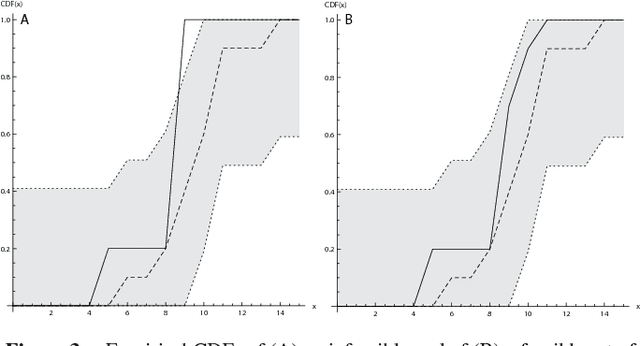
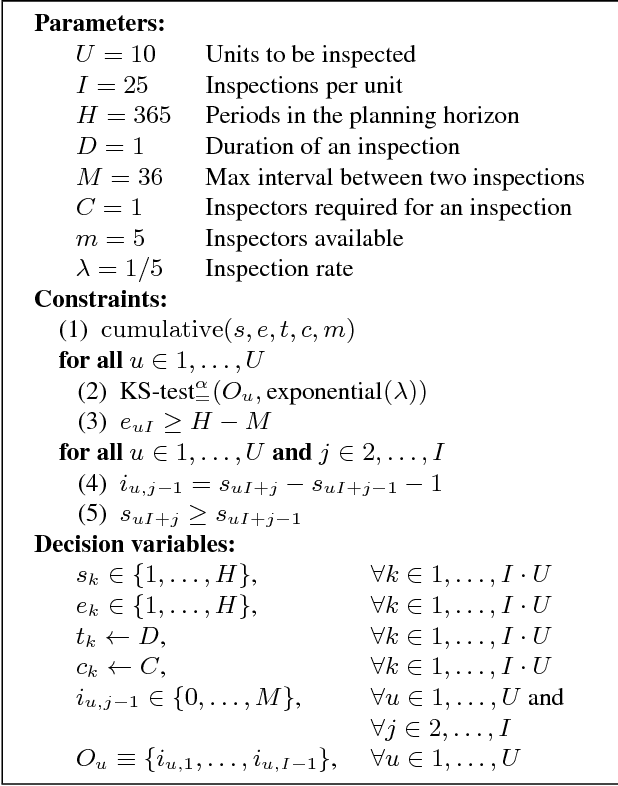
Abstract:We introduce statistical constraints, a declarative modelling tool that links statistics and constraint programming. We discuss two statistical constraints and some associated filtering algorithms. Finally, we illustrate applications to standard problems encountered in statistics and to a novel inspection scheduling problem in which the aim is to find inspection plans with desirable statistical properties.
 Add to Chrome
Add to Chrome Add to Firefox
Add to Firefox Add to Edge
Add to Edge